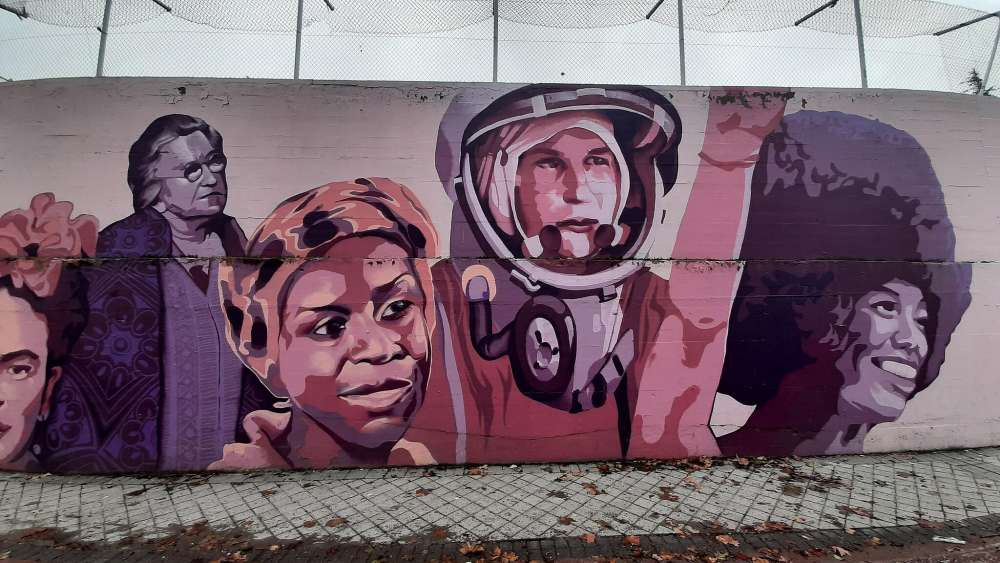Building Peace, the Feminist Foreign Policy Way: Good Practices

How can a feminist foreign policy translate into more feminist ways of funding and supporting conflict prevention, stabilization and peacebuilding? As Germany – the largest peacebuilding donor globally – joins the club of governments explicitly committed to implementing a feminist foreign policy, its ambition and success in mainstreaming a “feminist way of peacebuilding” will have important consequences for the field as a whole. In so doing, Berlin can build on plenty of experience from other governments, but even more so from feminist civil society actors and activists around the world. This report provides an initial overview of good practices and their underlying logic: real-world examples in which at least some principles of an inclusive feminist foreign policy have been put into action.
The examples of good practices collected in this report demonstrate that a feminist approach to peacebuilding is not only possible, but already followed by a variety of implementers across the globe. These good practices also indicate ways in which a feminist foreign policy can achieve positive impact: by empowering and resourcing local actors that demand political, transformative and inclusive approaches to peacebuilding. For such a cooperation to succeed, a proper understanding of the local context is key to identifying and investing in promising partnerships.
It is worth noting that the good practice examples presented in this report are not representative of the vast universe of peacebuilding projects and funding mechanisms. Instead, we used a snowballing methodology to identify local practitioners to nominate candidate cases, which we then filtered for substantive fit within the report’s scope of an inclusive feminist foreign policy and a political approach to peacebuilding. The examples cover a range of thematic goals: the prevention of re-radicalization, the resourcing of women’s rights organizations, women peacebuilders and young feminist activist in crisis settings, the transformation of violent masculinities, and gender-sensitive reconciliation and reintegration.
Drawing from the identified examples and the interviews we conducted to select them, we find several criteria that “make” a good practice. We argue that adopting a feminist foreign policy requires external peacebuilders to change both what they fund and how they fund, as well as on which terms they collaborate with local implementers. If successful, these adjustments lead peacebuilding actors to not only re-distribute their resources, but also yield greater agenda-setting and decision-making power over to marginalized groups and their representatives. While feminist foreign policy by itself does not pretend to solve all tensions and contradictions associated with foreign-funded peacebuilding, it holds the promise of finding more – and better – context-sensitive solutions that give space for feminist progress and more effective peacebuilding.
Regarding what and who to fund, government donors can make greater efforts to work with local and locally-based actors, which may require indirect support mechanisms via implementers and feminist networks. Donors can build dedicated analytical efforts into projects that properly assess exclusionary structures and their interactions with conflict dynamics, and implement necessary measures to mitigate them.
When it comes to how to fund such efforts, a key to more sustainable and stable partnerships with implementers is core or institutional funding. Additionally, actively promoting implementing partners to exchange and learn from one another is beneficial for all sides, as it allows partners to grow and donors to expand their networks. Since local conditions may rapidly change in volatile environments, flexibility is paramount. Where a degree of flexibility already exists, donors need to better communicate this to implementing partners and provide procedural support to leverage available flexibility as necessary.
Finally, the terms of working together are crucial for a more feminist approach to peacebuilding. Extending trust to local partners is key, even if this can be difficult for large organizations and government actors. However, our good practice examples show that there are low-risk ways of building up this trust that can lead to impactful results. Finally, promoting organizational capacity building is particularly important when working with more local grassroots initiatives, as is striking a balance between establishing trusted partners and enabling access for new actors.
This study was funded by German Federal Foreign Office.







